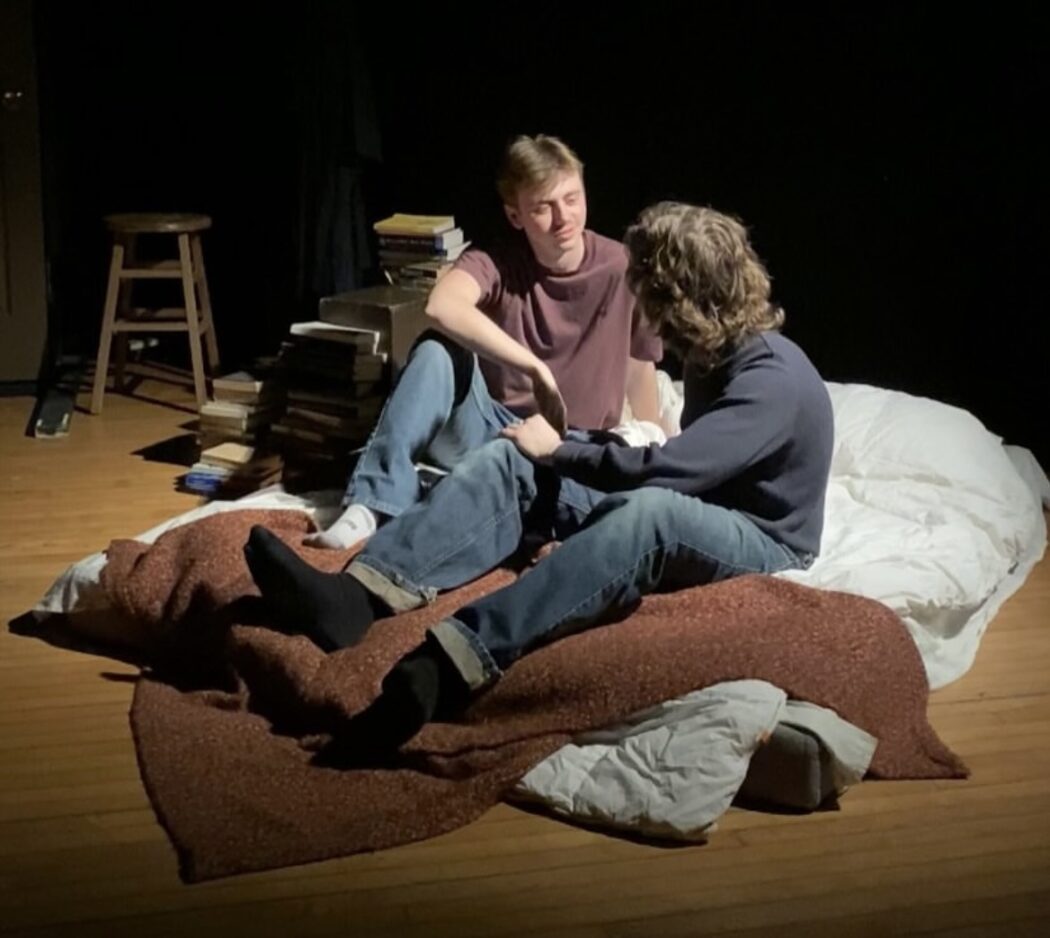When Gus wakes up to find a stranger in his bed, he screams—then folds the clothes on the floor. Meticulous and orderly, he tries to ignore the presumably drunken mistake currently sprawled across his mattress. But when Theo, the mystery man, rises and greets his host with a cocky full-frontal, it becomes clear that Gus cannot conduct business as usual—especially when news of a brutal blizzard means Theo won’t be leaving anytime soon.
Confined to Gus’s cramped studio apartment, the two spar wittily over painting, books, and chess, each championing their preferred brand of intellectual pretension. Theo’s eccentric nonchalance, portrayed by Sam Snyder, grates against Gus’s nervous rigidity, brought to life by Hayden Jackson. Meanwhile, a third character, The Radio, played with the comedic precision of Ryan Jacoby, injects humor into the friction, cutting through their conversations with topical news and absurd advertisements. As Theo’s relentless questions and teasing chip away at Gus’s composure, the two men gradually carve out an unexpected intimacy. Teetering between attraction and irritation, Gus ultimately succumbs, dissolving their simmering tension in a fleeting moment of tenderness.
But the warmth doesn’t last. When Gus wakes, Theo is distant—his earlier charm replaced with icy detachment. With scathing, calculated insults, he weaponizes the very vulnerability he coaxed out, turning intimacy into cruelty. In this brutal display of manipulation, the play asks the audience: Is Gus the Devil, or simply a hellish hookup?
Writer-director duo Jack Bouchard and Odessa Rontogiannis helmed Sphinx for Tuesday Night Café Theatre (TNC) from March 18-21. In our conversation, they shared insights into the play’s conception and reflected on their collaborative experience.
***
Playwriting is a much less common medium for creative students at McGill. Did the collaborative nature of writing Sphinx make the process easier by allowing you to bounce ideas off of each other, or did it pose additional challenges in shaping a unified vision?
OR: I think it was really helpful because we both have different strengths. One thing that Jack is really good at is coming up with the idea and actually getting started. I find it way easier to jump in on something when the idea is already established, so that was super helpful. With writing, especially on your own, it’s so easy to get wrapped up in your own vision, and you kind of lose sight of what might sound good or look good. Having someone else read over your work keeps you grounded, I feel. I think that’s how we manage to get dialogue that sounds so realistic.
JB: Yeah, definitely. I think that there were a lot of times where if I had been alone, I would write something, and I’d come in and [ask], “Hey, what if we did like a ten-minute weird silent scene?” and Odessa would be like, “Yeah, no.” I think it was really nice to have someone to edit with.
Sphinx was rich with both vulnerability and humor. How did the two of you craft the script to balance moments of levity with the tension and complexity of the relationship between Gus and Theo?
JB: I think the tension definitely came first. It was always a story about Gus and Theo. We knew we were exploring that dynamic, but we kind of thought that it came off a little bit too serious, and we agreed that this is not the place to try and show that we’re smart. We wanted it to be fun and entertaining and engaging while still [expressing something] deeper. The Radio really came [later] because we thought it was a really good way of getting away from dramatic student theatre, which I think is hard to do well.
OR: When we were writing during the summer, Jack was in Vancouver and I was in London, so we were definitely writing separately. When we actually got back to Montreal and started working on it in the same room, that’s when the lighter bits started coming in because that was just us goofing around basically.
JB: Shout out to Ryan, who played The Radio. He is really funny, and we gave him the chance to rewrite a lot of The Radio’s lines. A lot of the humor added by that part was actually also written by him.
The confined setting of Gus’s apartment becomes a character in its own right, drawing the audience into an intimate, almost voyeuristic experience as the characters engage. Can you describe your approach to staging and set design to achieve its effect?
JB: Yeah, well, a lot of people said that they really liked our set, and I think what really made ours so interesting was the fact that it only exists within one night, [given] the temporal setting of the play. [Gus only] has one fork and one knife because only one person eats, and he has two wine glasses and one bowl with two eggs in it. We sort of leaned into [the minimalism rather than] feeling like we had to have a super detailed set that looked exactly like an actual apartment. The set is just a fabrication and only exists for this one interaction, [which] gave us the chance to [simplify]. [A smaller space and budget] limited us, but in limiting us, it actually ended up benefiting us.
Gus and Theo are portrayed as flawed yet undeniably magnetic characters. What was your process for developing their contrasting personalities and, specifically, the ambiguity surrounding Theo’s true nature?
JB: Even from the very first draft that I wrote, which was 12 pages long, I was always playing with the opposition between Apollo and Dionysus in classical Greek [mythology]. Dionysus obviously is the god of theatre, which is nice, but also of wine, and recklessness, and love. Apollo is the opposite—he’s very rational, you know, organized. It’s this sort of classical opposition that we wanted to bring to life with these characters.
OR: It is cool because, I mean, I don’t even have an answer for the ending, but so many people have come up to me now, asking questions. They’ve come up with their own theories and [they’ve thought] about it so much. Up until [the ending], the play is quite on the nose. Having that final scene forces people to have a think.
The play features a deeply funny depiction of Montreal-brand pretension, with intellectual and cultural references that feel both sharp and authentic. How did the two of you choose those references, and what role did they play in shaping the dynamics between Gus and Theo?
OR: These characters are living in their own little timeless bubble, and we can’t quite locate it in space or time. Even the script says it’s “vague vintage.” It was important to me that we didn’t reference anything that was in any way contemporary. It ages a piece of media so badly when they start talking about TikTok or something.
JB: I also think that there’s this lovely sort of comedic bit about Theo learning French and having these deep Francophile sensibilities. And I think [that aspect of his character pairs well with] Gus’s mispronunciation of [Proust] the whole way through. A lot of those references were fun to write because [they demonstrate Gus and Theo’s] pretension and the push and pull [it creates] between them.
What do you hope that audiences took away from the play?
OR: Can I start with something silly? I’m a big believer in [the idea] that people should just go to the theatre so they [can] have a good time. Hopefully no one sees themselves in these characters too much, but I think in having the dichotomy between them, we can recognize ourselves in both of them. [When audiences watch] that realistic interaction [play out], at least in the beginning bit, hopefully it feels a bit familiar.
JB: I agree especially with the first thing [Odessa] said. I hope people had a good time. I hope this encourages people to go to the theatre. I hope that people appreciate the 45-minute piece of content. I think that there’s something to be said for a play that’s not two hours long. Same goes for film or any other medium.
This interview has been edited for length and clarity.








